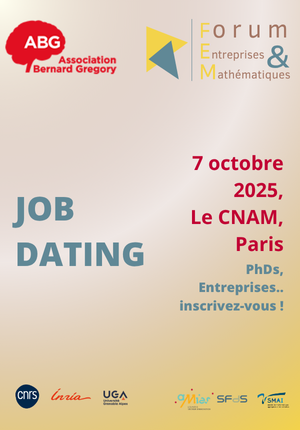La bionique des plantes thigmotropiques
| ABG-132493 | Sujet de Thèse | |
| 12/06/2025 | Contrat doctoral |
- Physique
- Biologie
- Robotique
Description du sujet
Climbing plants, such as vines, cucumbers, squash, watermelons, and peas, have rod-like, flexible structures called tendrils that enable them to attach to supports through thigmotropism, adopting helical conformations. Our preliminary results indicate that singular snapping-like events can occur in both bioinspired synthetic helices and living tendrils. This serves as proof of concept for our proposal: transitioning from bioinspired to bionic snapping-prone systems : human-conditioned living systems with specifically designed mechanical properties. We will begin by developing a fundamental understanding of instabilities in elastic rods to determine the conditions under which living plant tendrils reach critical snapping-prone conformations. This knowledge will enable us to create a "tendril motor" : a bionic device without frictional articulation (i.e., no pistons or rotating parts) that leverages thigmotropic differential growth to generate rapid mechanical action through snapping.
Nature du financement
Précisions sur le financement
Présentation établissement et labo d'accueil
Cotutelle : This PhD project will take place both in Paris (laboratoire MSC, Université Paris Cité) with Dražen Zanchi (DZ) and in Lyon (ENS de Lyon) with Julien Derr (JD)
DZ: Head of the DOMM team in the MSC laboratory, 30-year-long experience in theoretical and experimental physics, participation and coordination of transversal/interdisciplinary and international actions in biophysics, soft-matter, chemical engineering, food science and pharmacology, since 2020 joins the MSC lab (group Dynamics and Organisation of Soft Matter) from his former affiliation (ENS Paris) to initiate and develop transversal actions focussed on dynamics and mechanics of living and soft matter systems: plant tendrils and related bioinspired devices (grant IDEX UPC “Dynavine” 2021-2022, Labex SEAM UPC « DynaSnap » 2025), bacterial adhesion (collaboration with University of Split, Erasmus Plus grant), microalgae dynamics in foams and near surfaces (CNRS grant Dynamique Plastisphère).
JD is a physicist working on morphogenesis and self-organisation. He is part of the MOSAIC team in the RDP laboratory of ENS Lyon. He works at the interfaces between physics and biology. He has been working on plant motions and growth for over a decade. He has expertise in fine kinematics (including managing 3D projection effects) and mechanics measurements. JD will benefit from plant dedicated infrastructures at RDP including growth chambers and greenhouses. JD will be mostly involved in the experimental part of the project : Design, set-up, kinematics tracking, mechanics measurement, data processing. He will also be involved in tutoring of the PhD student.
Intitulé du doctorat
Pays d'obtention du doctorat
Thèse en cotutelle
OuiPays d'obtention du doctorat en cotutelle
Etablissement délivrant le doctorat en cotutelle
Profil du candidat
We are looking for a candidate with strong background in general physics and mechanics. This PhD work demands also high motivation for performing mechanics experiments. Interest in biological system is a plus. The student is expected to participate in two sets of experiments. The first set will take place at MSC, primarily supervised by DZ on a daily basis and by JD through weekly meetings (mostly via Zoom). These experiments will focus on mechanics, as described above (cf. supra). The second set will be conducted at RDP, with regular supervision by JD and weekly Zoom meetings with DZ. The schedule for these experiments will be organized to minimize unnecessary travel while ensuring efficient progress in the PhD. Details of the experimental work are provided in the project description (cf. infra). The thesis will be equally divided between MSC and RDP (50/50), with DZ and JD contributing equally to its supervision. Twice a year, joint meetings between the MSC and RDP teams will be held alternately in Paris and Lyon. These meetings will provide an opportunity to enhance the PhD’s progress and foster collaboration. In addition to the regular annual thesis committee (CDT) meetings, these gatherings will offer valuable training in oral communication and presentation skills. Furthermore, the student will participate in GDR Phyp meetings and attend at least one international symposium on plant biophysics.This PhD structure will equip the student with the necessary skills and flexibility to work on both the physical (mechanical) and biological aspects of this inherently multidisciplinary topic. The dynamic French plant physics community, particularly around the GDR, will provide an excellent environment for the student to build a strong professional network for the future.
Vous avez déjà un compte ?
Nouvel utilisateur ?
Vous souhaitez recevoir nos infolettres ?
Découvrez nos adhérents
 SUEZ
SUEZ  TotalEnergies
TotalEnergies  ADEME
ADEME  MabDesign
MabDesign  PhDOOC
PhDOOC  ANRT
ANRT  Groupe AFNOR - Association française de normalisation
Groupe AFNOR - Association française de normalisation  ASNR - Autorité de sûreté nucléaire et de radioprotection - Siège
ASNR - Autorité de sûreté nucléaire et de radioprotection - Siège  MabDesign
MabDesign  Aérocentre, Pôle d'excellence régional
Aérocentre, Pôle d'excellence régional  ONERA - The French Aerospace Lab
ONERA - The French Aerospace Lab  Ifremer
Ifremer  Tecknowmetrix
Tecknowmetrix  Nokia Bell Labs France
Nokia Bell Labs France  Laboratoire National de Métrologie et d'Essais - LNE
Laboratoire National de Métrologie et d'Essais - LNE  CASDEN
CASDEN  CESI
CESI  Généthon
Généthon  Institut Sup'biotech de Paris
Institut Sup'biotech de Paris


